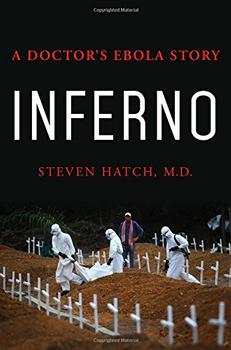Summary | Excerpt | Reviews | Beyond the Book | Readalikes | Genres & Themes | Author Bio

A Doctor's Ebola Story
by Steven Hatch
Emile, of course, did have Ebola. He died on December 28. The death of a child in this setting is not all that uncommon; on average, nearly one out of every ten children born in sub-Saharan Africa does not live to see their sixth birthday. But the despair of the Ouamouno family would not end there. On New Year's Day 2014, Emile's three-year-old sister Philomène became ill and would follow Emile to the grave by January 5. Both were cared for by Sia, who was then seven months pregnant with her third child. The fever hit her the day after Philomène died. Sia had a miscarriage on January 11 and died that same day. Emile and Philomène's grandmother, Koumba Ouamouno, cared for all of them. Her symptoms started the same day Sia miscarried, which meant that she had been incubating the virus for at least a few days, perhaps more.
Koumba sought care in a hospital in Guéckédou, and from there the linear chain of the West African outbreak starts to expand in multiple directions. A midwife became ill at the hospital; one of her close relatives traveled north from Guéckédou to a village known as Damdou-Pombo, and a half-dozen people there were killed. Another staff member at the hospital traveled east to Macenta, a city of nearly a hundred thousand people, and a chain of transmission started there. A doctor in Macenta died and was transported back to his ancestral home in Kissidougou, a city of about the same size. His brothers prepared his body for the funeral, and they became infected and started an epidemic there. Another person carried the virus from Guéckédou to a different village called Dawa. By then, several weeks had passed, and the outbreak had quietly begun to creep outward. The virus was edging along, as if to test its boundaries.
The Zaire Ebolavirus had several advantages in its ability to cause destruction in West Africa that an identical copy of it would have lacked in Central Africa. First, it had never been seen before in any of these countries, so local health officials were slow to recognize what was happening. One of the initial beliefs was that it was cholera, and since cholera was largely a regional concern rather than an international crisis, time was lost in the initial diagnosis.
Second, there wasn't much of a health infrastructure in place for local officials to even see the data. To track an outbreak of any kind, from the most feared, like Ebola, to the most mundane, like a diarrheal outbreak in Iowa following a family reunion one August afternoon, cases have to be carefully tracked and recorded. For that to happen, there needs to be someone paid to do this—typically this is a function of government—and there needs to be a centralized bureaucracy to collect and process the information. But Guinea was not only poor; its southeastern corner had felt the ripples from Liberia's Civil War, as tribal alliances brought Guineans into the conflict, with the result that an already impoverished corner of the world had damaged what tenuous infrastructure was in place. Of the three countries of Guinea, Sierra Leone, and Liberia, Guinea might have been in the best shape in this respect, but that wasn't saying much.
Third, there was a new technology that permitted the virus to travel vast distances in a fairly short time. It wasn't cars or airplanes, which were luxuries far too costly for poor agrarian communities in this part of the world. But it was at some level the underprivileged person's solution to achieving mobility: the motorcycle. Cheap, relatively easy to maintain, far more gas efficient than cars, and much more versatile in narrow and muddy country jungle roads than buses, motorcycles provided the perfect answer for remote villagers needing cheap transportation to sell their wares and engage in trade. One or two generations before, travel from a place like Meliandou to Guinea's capital of Conakry could take many days and be exorbitant. With motorcycles, one could travel not only to Conakry but to Sierra Leone's capital of Freetown or Liberia's capital of Monrovia in less than a day. Whole fleets of motorcycles could be found in the regional centers, and ferrying passengers around became an important part of the local economy. Riding on a motorcycle also requires close contact with the driver, which provided another chance for the virus to spread beyond normal traditional family or tribal routes.
Excerpted from Inferno by Steven Hatch. Copyright © 2017 by Steven Hatch. Excerpted by permission of St. Martin's Press. All rights reserved. No part of this excerpt may be reproduced or reprinted without permission in writing from the publisher.
Your guide toexceptional books
BookBrowse seeks out and recommends the best in contemporary fiction and nonfiction—books that not only engage and entertain but also deepen our understanding of ourselves and the world around us.